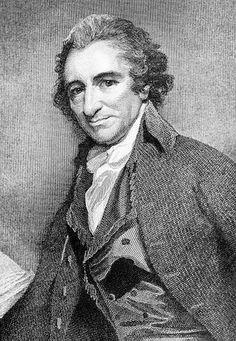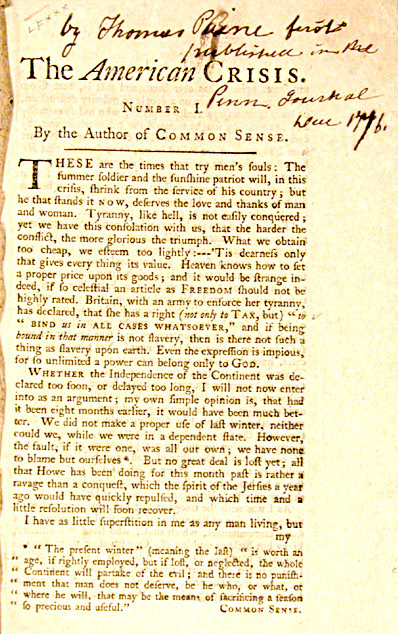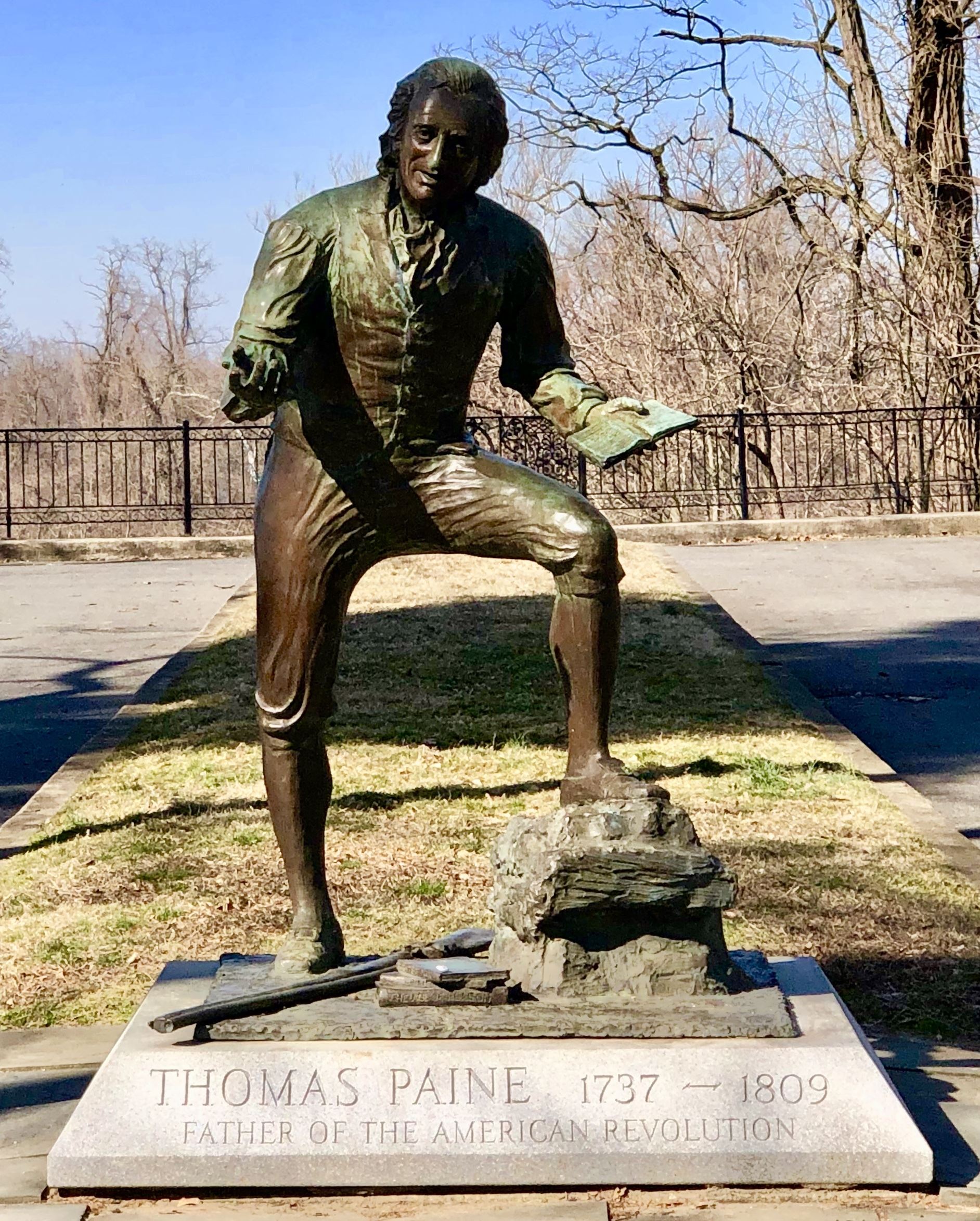"These are the times that try men's souls: The summer soldier and the sunshine patriot will, in this crisis, shrink from the service of his country; but he that stands it now, deserves the love and thanks of man and woman".
This Multi Stage Cache will take you to the home town of Thomas Paine and a memorial statue where you will find the answers to the questions to solve the clues to the final cache which is within 2 miles away.
Thomas Paine (1737–1809) was an English American writer and pamphleteer whose "Common Sense" and other writings influenced the American Revolution, and helped pave the way for the Declaration of Independence.
 ”Thomas Paine"
”Thomas Paine"
During the American Revolution, Paine served as a volunteer personal assistant to General Nathanael Greene, traveling with the Continental Army. While not a natural soldier, Paine contributed to the patriot cause by inspiring the troops with his 16 "Crisis" papers, which appeared between 1776 and 1783.
Thomas Paine was an influential 18th-century writer of essays and pamphlets. Among them were "The Age of Reason," regarding the place of religion in society; "Rights of Man," a piece defending the French Revolution; and "Common Sense," which was published during the American Revolution. "Common Sense," Paine's most influential piece, brought his ideas to a vast audience, swaying the otherwise undecided public opinion to the view that independence from the British was a necessity.
After the battles of Lexington and Concord (April 19, 1775), which were the first military engagements of the American Revolutionary War, Paine argued that America should not simply revolt against taxation, but demand independence from Great Britain entirely. He expanded this idea in a 50-page pamphlet called "Common Sense," which was printed on January 10, 1776.
The pamphlets were contemporaneous with early parts of the American Revolution, when colonists needed inspiring works. The American Crisis series was used to "recharge the revolutionary cause." Paine, like many other politicians and scholars, knew that the colonists were not going to support the American Revolutionary War without proper reason to do so.
Written in a language that the common person could understand, they represented Paine's liberal philosophy. Paine also used references to God, saying that a war against Great Britain would be a war with the support of God. Paine's writings bolstered the morale of the American colonists, appealed to the British people's consideration of the war, clarified the issues at stake in the war, and denounced the advocates of a negotiated peace. The first volume famously begins: "These are the times that try men's souls."
In the winter of 1776 was a time of need in the colonies, considering Philadelphia and the entire rebel American cause were on the verge of death and the revolution was still viewed as an unsteady prospect. Paine wanted to enable the distraught patriots to stand, to persevere, and to fight for an American victory. Paine published the first Crisis paper on December 19th.
Its opening sentence was adopted as the watchword of the movement to Trenton. The opening lines are as follows:
These are the times that try men's souls: The summer soldier and the sunshine patriot will, in this crisis, shrink from the service of his country; but he that stands it now, deserves the love and thanks of man and woman.
Paine brought together the thirteen diverse colonies and encouraged them to stay motivated through the harsh conditions of the winter of 1776. Washington’s troops were ready to quit until ordered by Washington to be read aloud Paine’s Crisis paper and heard the first sentence, “These are the times that try men’s souls.” The pamphlet, read aloud to the Continental Army on December 23, 1776, three days before the famous Washington's crossing and the Battle of Trenton.
This reading bolstered morale and resistance among patriots, as well as shame neutrals and loyalists to support the cause:Tyranny, like hell, is not easily conquered; yet we have this consolation with us, that "the harder the conflict, the more glorious the triumph".
'Common Sense'
Worded in a way that forces the reader to make an immediate choice, "Common Sense" presented the American colonists, who were generally still undecided, with a cogent argument for full-scale revolt and freedom from British rule. And while it likely had little effect on the actual writing of the Declaration of Independence, "Common Sense" forced the issue on the streets, making the colonists see that a grave issue was upon them and that a public discussion was direly needed.
Once it initiated debate, the article offered a solution for Americans who were disgusted and alarmed at the presence of tyranny in their new land, and it was passed around and read aloud often, bolstering enthusiasm for independence and encouraging recruitment for the Continental Army. ("Common Sense" is referred to by one historian as "the most incendiary and popular pamphlet of the entire revolutionary era.")
Paine wrote "Common Sense" in an unadorned style, forgoing philosophical ponderings and Latin terms, and relying instead on biblical references to speak to the common man, as would a sermon. Within just a few months, the piece sold more than 500,000 copies. "Common Sense" presents as its chief option a distinctly American political identity and, more so than any other single publication, paved the way for the Declaration of Independence, which was unanimously ratified on July 4, 1776.
Crisis' Papers
"The American Crisis. Number I" was published on December 19, 1776, and began thusly: Its opening sentence was adopted as the watchword of the movement to Trenton. The opening lines are as follows: These are the times that try men's souls: The summer soldier and the sunshine patriot will, in this crisis, shrink from the service of his country; but he that stands it now, deserves the love and thanks of man and woman.
The American Crisis, or simply The Crisis, is a pamphlet series by eighteenth-century Enlightenment philosopher and author Thomas Paine, originally published from 1776 to 1783 during the American Revolution. Thirteen numbered pamphlets were published between 1776 and 1777, with three additional pamphlets released between 1777 and 1783. The first of the pamphlets was published in The Pennsylvania Journal on December 19, 1776. Paine signed the pamphlets with the pseudonym, "Common Sense".
George Washington's troops were being decimated, and he ordered that the pamphlet be read to all of his troops at Valley Forge, in hopes of inflaming them to victory.
 ”The American Crisis"
”The American Crisis"
 ”Thomas Paine"
”Thomas Paine"
PUZZLE:
Kid Friendly Field Puzzle
To solve the coordinates, locate the Thomas Paine Statue and find the information to the final cache which is within 2 miles away.
N40 08. AB W074 42.CD
.
The Clues
A = "Name of his horse?" Silver = (7) Button = (8) Gary = (6)
B = "Letter from Europe date"? 1775 (35) 1776 = (20) 1789 = (28)
C = "Bordentown Historical Society dedicated date"? 6-7-97 = (9) 5-20-68 = (7) 8-12-70 = (0)
D = "Locate the sculpture's Holofcener, bottom of rock", what year made? 1958 = (14) 1970 = (24) 1997= (19)
This cache is one of "The American Revolution Geo~Trail" caches throughout New Jersey. These special geocaches are hidden at historic locations which have a connection to important New Jersey's American Revolutionary War history. To participate in the optional Geo-Trail, after you find the geocache, locate the secret code and record it into your passport which you will print from the Geo~Trail website. Information at njpatriots.org
 ”njpatriots.org"
”njpatriots.org"
The Northern New Jersey Cachers, NNJC is about promoting a quality caching experience in New Jersey. For information on The Northern New Jersey Cachers group you can visit: www.nnjc.org.
 nnjc.org & metrogathering.org, & njpatriots.org
nnjc.org & metrogathering.org, & njpatriots.org